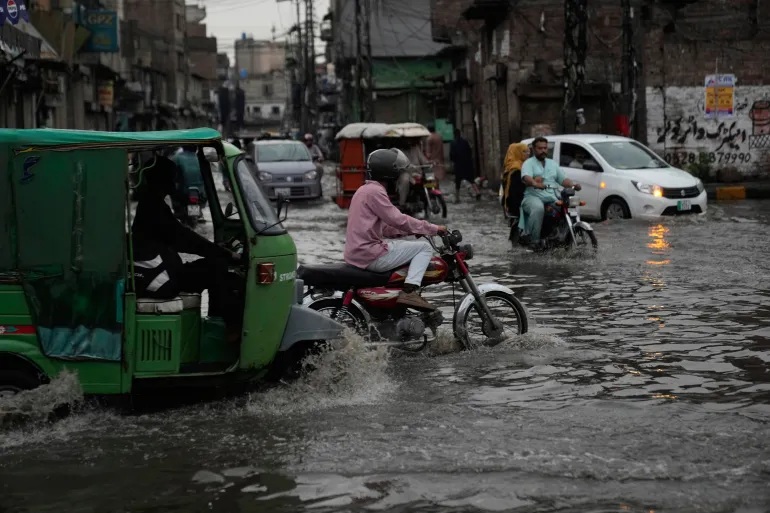Pakistan is grappling with the devastating aftermath of nearly a week of relentless monsoon rains and flash floods that have claimed the lives of at least 46 people and injured many others, according to government officials.
The heavy downpours, described as abnormally intense for this season, have wreaked havoc across multiple provinces, prompting urgent warnings and emergency responses.
Widespread Impact Across Provinces
The National Disaster Management Authority (NDMA) and provincial emergency agencies reported the fatalities on Monday, June 30, 2025, detailing the geographic spread of the disaster.
The hardest-hit region was Khyber Pakhtunkhwa in northwest Pakistan, where 22 people lost their lives.
Punjab, the populous eastern province, recorded 13 deaths, while Sindh in the south and Balochistan in the southwest reported seven and four fatalities respectively.
This tragic toll underscores the widespread nature of the flooding, which has affected both urban and rural communities, disrupting lives and livelihoods across the country.
Meteorological Warnings and Historical Context
Irfan Virk, deputy director of Pakistan’s Meteorological Department, informed the Associated Press that the country is currently experiencing above-normal rainfall during the monsoon season.
He emphasized that authorities have been alerted to the heightened risk, with precautionary measures urged to mitigate further damage.
Virk also cautioned that the possibility of extreme weather events, similar to the catastrophic floods of 2022, cannot be ruled out.
Last year’s floods were among the worst in Pakistan’s history, submerging nearly one-third of the country, killing 1,737 people, and causing widespread destruction to homes, infrastructure, and agriculture.
The current situation has understandably raised fears of a repeat disaster, especially as the monsoon season progresses.
Tragic Loss of Tourists in Swat River
Among the recent fatalities, one of the most heartbreaking incidents involved a family of 17 tourists caught in the swollen Swat River in Khyber Pakhtunkhwa.
On Friday, flash floods swept away 13 members of this family, while the remaining four were rescued.
Bilal Faizi, a spokesman for the provincial emergency services, reported that rescuers had recovered 12 bodies from the river.
The spokesman further said divers are continuing their search for the last missing family member as of Monday.
This tragedy has deeply affected the local community and sparked widespread grief across the nation.
Public Outcry Over Emergency Response
The incident involving the tourists has also triggered significant public criticism on social media platforms.
Many Pakistanis expressed frustration over what they perceived as a delayed and inadequate response by emergency services, calling for better preparedness and faster action in future crises.
In response to the ongoing floods and the potential for further hazards, the National Disaster Management Authority had issued warnings on Sunday.
It advised citizens to avoid crossing rivers and streams.
These advisories aimed to prevent additional casualties amid the dangerous conditions caused by the heavy rains.
Broader Implications and the Need for Preparedness
The recent floods highlight the vulnerability of Pakistan to monsoon-related disasters, which are becoming increasingly severe due to climate change and environmental degradation.
The country’s infrastructure and emergency systems face enormous challenges in coping with such natural calamities, especially in remote and flood-prone areas.
For the global audience, particularly those aged 20 to 65 who are keenly aware of climate issues and humanitarian crises, Pakistan’s situation serves as a stark reminder of the urgent need for enhanced disaster preparedness.
It also reminds all of the urgent need for resilient infrastructure, and international cooperation in addressing the impacts of extreme weather.
Conclusion
As Pakistan continues to battle the consequences of these heavy monsoon rains, the focus remains on rescue operations, providing aid to affected communities, and preventing further loss of life.
The government and meteorological authorities are closely monitoring the situation, urging vigilance as the monsoon season progresses.
The tragic loss of lives, including the tourists swept away in the Swat River, underscores the human cost of these natural disasters and the critical importance of swift, coordinated emergency responses.
For music lovers, fans of global culture, and concerned citizens worldwide, Pakistan’s floods are a poignant example of how climate change is intensifying weather patterns and threatening vulnerable populations.
The coming weeks will be crucial in determining how effectively Pakistan can manage this crisis and build resilience against future monsoon seasons.
Meanwhile, the world watches with empathy and hopes for the safety and recovery of all those affected.







